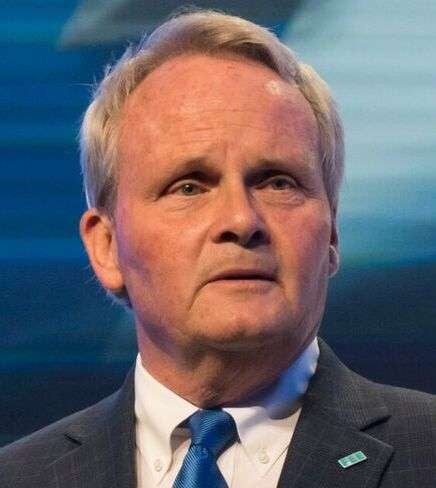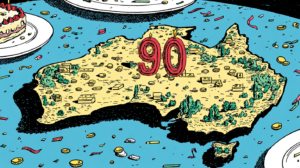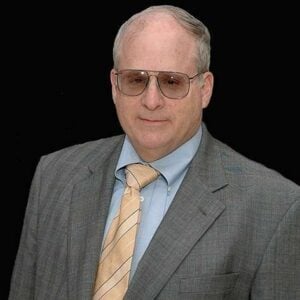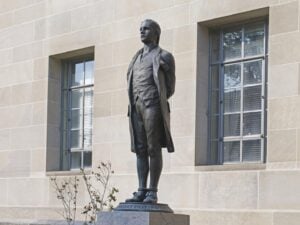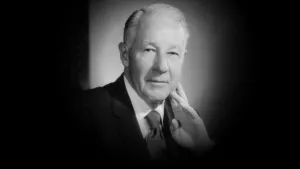Blanchard Devoted His Life to Numerous Noble Causes
Great movements are marked by the dedication and accomplishments of steadfast individuals who make the most of every moment, every opportunity, and every available resource. When those great men and women pass from the scene, they leave behind untold numbers of friends and followers who derive comfort from their memory and inspiration from their deeds.
Such a man was James U. Blanchard III, who died on March 20, 1999, at the age of 55. The causes to which he devoted ceaseless energy and for which his name will always be associated are liberty and sound money. Jim knew that neither one is long safe without the other, and few American businessmen in the second half of the twentieth century did as much as he to promote them both. The opening sentence of his family’s formal notice of his passing summed him up well: “James U. Blanchard III was a man who accomplished much against great odds, and changed more people’s lives than he ever knew.”
I was privileged to know Jim Blanchard for the last 15 years of his life. For two years I served as an economist for his firm. I spoke at many of his conferences. I traveled with him to Brazil, Nicaragua, and Kenya. Though many others knew him better, it didn’t take much acquaintance with him for anyone to marvel at what a man in a wheelchair can get done if he puts his mind to it. Jim was nearly killed in a tragic automobile accident at the age of 17 and was unable thereafter to walk. But if anything, his handicap only spurred him on.
Not once did I hear Jim Blanchard bemoan his physical plight. If he talked about it at all, it was to relate how sitting in a wheelchair gave him time to read. In his 20s he read voraciously. Introduced to the writings of Ayn Rand by a medical student friend, he became an unabashed defender of laissez-faire capitalism. Rand’s influence on Jim is perhaps best exemplified by the name he gave his oldest son: Anthem. Jim also became a devoted reader of The Freeman and books by FEE’s founder, Leonard Read.
In 1974, Gerald Ford signed a bill that restored the right of Americans to own gold. The real hero of that moment was Jim Blanchard, who had formed the National Committee to Legalize Gold in 1971 and spearheaded a nationwide grassroots campaign. He knew that governments don’t like gold because they can’t print it. He saw gold ownership as a fundamental human right, a hedge against government mismanagement of money, and the first essential step down the long road to monetary integrity.
True to his spirit, some of Jim’s efforts were dramatic and unconventional. He arranged for a biplane to tow a “Legalize Gold” banner over President Nixon’s 1973 inauguration. He also held press conferences around the country at which he would brandish illegal bars of gold and publicly defy federal officials to throw him in jail. These and many other stories about Jim’s colorful career can be found in his 1990 autobiography, Confessions of a Gold Bug.
Once gold became legal, he held his first annual investment conference in New Orleans. Expecting 250 attendees, he was stunned to see 750 show up. Now in its 26th consecutive year, Blanchard’s New Orleans Investment Conference has drawn tens of thousands of individuals from all 50 states and 35 nations. Investment advice comprised most of the 25 programs Jim assembled, but he always made sure that attendees were provided a hefty dose of sound-money and free-market ideas. His speakers included Milton Friedman, F. A. Hayek, Robert Bleiberg, Walter Williams, and many other great economists. Ayn Rand’s last public appearance was at a Blanchard conference.
In the meantime, Jim’s original $50 investment to begin a coin business in the 1970s blossomed into a giant within the industry. When he sold the business 15 years later, it was a $115-million-a-year precious-metals and rare-coin company. In 1993, he launched a second such firm, Jefferson Coin & Bullion, Inc.; it’s already one of the largest in the United States. Other business ventures he helped start were notably successful, including the Blanchard Group of Funds, which held as much as $1.7 billion under management before being sold in July 1995. He cofounded the Industry Council for Tangible Assets to combat unscrupulous business practices in the coin and bullion industry, and he helped reverse several burdensome laws and regulations that afflicted American investors.
Jim’s adventurous instincts and love of liberty combined to put him on the front lines of important struggles around the world. On my return in 1986 from visiting with activists in the anti-communist underground in Poland, I went to Jim with a request. I advised him that for $5,000, pro-freedom forces in Warsaw could translate Milton Friedman’s Free to Choose into Polish and then print and distribute hundreds of copies throughout the country. He wrote that check on the spot, and many others for similar causes behind the Iron Curtain. Not content only to fund these worthy endeavors, he often transported illicit, pro-freedom literature himself when he visited communist countries.
One of Jim Blanchard’s favorite foreign projects was assisting anti-communist rebel forces inside war-torn Mozambique in the 1980s and early 1990s. He once sent a colleague and me on a clandestine journey inside the country to live for two weeks with the rebels in the bush and help spread a pro-freedom message. Once the war was over and Mozambique adopted policies friendly to private property and free markets, Jim pitched in to assist in reconstruction. Through Blanchard Mozambique Enterprises, he obtained a concession to rejuvenate 580,000 acres and create the largest privatized game reserve in the world. His plans for the development of lodges and resort facilities within the reserve will go forward and will in turn support the wide-scale reintroduction and protection of a number of big game animals.
Jim Blanchard overcame personal tragedy to become a powerful figure for liberty and sound money. His indomitable spirit lives on in all those who know that the noble causes to which he devoted his life require both hard work and eternal vigilance.
